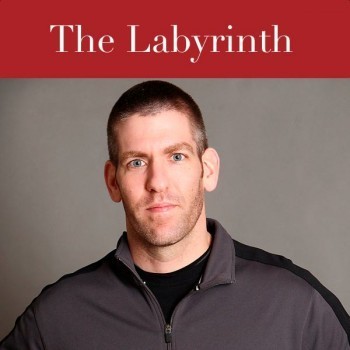Cesar Torres's Blog, page 11
December 17, 2012
Lucid Dreaming Ledger – Effects of Caffeine and Alcohol on Dreaming

Image via DerekGarvey
Who knew that writing a dream journal would make me more productive? Wasn’t caffeine supposed to do that? Well, waking up every morning and writing down dreams is having interesting effects on me.
What’s funny about writing a dream journal is that even if I am short on time to write my entries, I have been able to stick to this task, because each morning I wake up, I am trying to recall every bit of detail before the dream is gone. That means that I have set aside a few minutes each day to write, before I begin checking email and even (YIKES) making coffee.
Sometimes, when I am finished with an entry, I will annotate a mention of what I think my sleep felt like the night before. In this way, I have been learning about what happens inside my dreams, but also about how well I am sleeping, which has a very strong influence on our ability to dream.
This will come as no surprise that these factors severely impact my dreaming, in both negative and positive ways:
Exercise
Light pollution in the room
Sleeping schedule
Timing of dinner against bed time
What I ate
What I drank
Today I want to talk about the last item in particular, because it’s been the one that seems to have the biggest impact on my ability to remember dreams, and to approach lucid dreaming.
Anything beyond a cocktail or two glasses of wine resulted in hazy dreams, and in two instances, no recollection of dreams at all.
I was angry about this. I really wanted to recall every dream. I guess moderation through dreaming habits could be a new trend.
Caffeine-wise, I didn’t notice anything dramatic, but I did notice that if I went beyond three cups of coffee in one day, the quality of recall was pretty crap. Again, I was foiled by the delicious liquids in life.
Of course, we need to keep in mind that the two substances mentioned above are known for disrupting sleep, so it’s important to note that they are probably affecting my ability to recall, rather than impede my ability to lucid dream.
As I continue this project, I will stick to two cups of coffee a day, and mind my Merlot as the holiday parties pop and churn around me.
As far as the lucid dreaming went last week, I did have one incredible dream of flying. I have flown in dreams before, but it’s been years. In this case I helped a friend escape danger by pulling her by the hand and taking off. Having this lucid dream really left me wanting more, which gives me the right kind of encouragement to monitor the chemicals I put in my body.
Have you tried out caffeine or alcohol and had better results than mine? Tell me how it turned out. I’d like to know.
The Labyrinth, Episode 25 – Ramez Naam
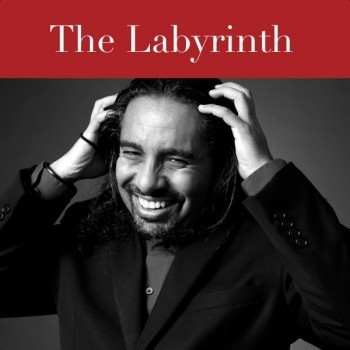 Ramez Naam is the author of “More than Human,” the 2010 H.G. Wells award-winning book that speculates a future where technology helps humanity transcend beyond the body. He’s written his first novel, “Nexus,” which releases today. Set in 2040, Nexus explores transhumanism and posthumanism as humanity develops a drug that can make minds connect with each other directly. He sat down with me to talk about his life as a transhumanist and, how he is often referred to as a proponent of the singularity, a label he has reservations about. We talk about the possibilities of moving the brain and the mind closer to others, essentially plugging in, as well as other topics like dreaming, writing and shamanism. Don’t forget to enter Ramez’s book giveaway in the links below!
Ramez Naam is the author of “More than Human,” the 2010 H.G. Wells award-winning book that speculates a future where technology helps humanity transcend beyond the body. He’s written his first novel, “Nexus,” which releases today. Set in 2040, Nexus explores transhumanism and posthumanism as humanity develops a drug that can make minds connect with each other directly. He sat down with me to talk about his life as a transhumanist and, how he is often referred to as a proponent of the singularity, a label he has reservations about. We talk about the possibilities of moving the brain and the mind closer to others, essentially plugging in, as well as other topics like dreaming, writing and shamanism. Don’t forget to enter Ramez’s book giveaway in the links below!
Subscribe and listen
Download and Listen: The Labyrinth, Episode 25 – Ramez Naam
iTunes
Subscribe via RSS
Links
Nexus
More than Human
Special book giveaway in conjunction with Nexus, at Ramez Naam’s site
Nexus imagines a world that is posthuman, not transhuman
December 13, 2012
The Labyrinth, Episode 24 – Jason Robillard
Jason Robillard is best known as a barefoot runner and writer, but it only takes a couple of minutes talking to him to know he is also a dozen more things. Yes, in this episode we talk about Jason’s book “The Barefoot Running Book,” and Barefoot Running University, which he founded. But we also discover how much of the world he intends to take in. This is a man who loves life and its experiences. We find out how to take off our shoes, how to experiment and be open to newness, and how to have good sex. Jason just kicked off his new writing project “The Sexpressionists” this year. If you’re into bare feet, sex, or just challenging yourself to the new things life has to offer, Jason’s the person to talk to.
Subscribe and listen
Download and Listen: The Labyrinth, Episode 24 – Jason Robillard
iTunes
Subscribe via RSS
Links
The Sexpressionists
The Barefoot Running Book
Barefoot Running University
December 10, 2012
Lucid Dreaming Ledger: Why Do We Dream About Cities?

AFR Top List – Fantasy Cities
I’m starting a new weekly feature today, called Lucid Dreaming Ledger. I’ll post links, resources and my own anecdotes in dreaming and in particular lucid dreaming.
As you know, a few weeks ago I started writing my first dream journal, annotating what happens in my dreams. This experiment has completely blown the doors off my notions about the imagination, and I can’t get enough of its discoveries. That’s why I want to share some of my findings with you.
When it comes to dreams, I wonder: Is it possible that we could have a predilection for setting? I am inspired by nature often, and its vistas are incredible in a dream, but why is it that I most often dream about cities? What is it about cities that makes them my psyche’s most-used setting?
It’s a mystery, friends. This mystery also makes me wonder, are there other persons who constantly dream of nature? Maybe they dream of a setting that is neither city nor nature? Is that you? I would love to know, leave me a comment.
My own dreams contain many cities from around the world. In many of them, I travel up skyscrapers, down tunnels, through subways, on top of houses, and inside museums. When I look at fictional cities like China Mieville’s New Crobuzon or Tolkien’s Miras Tirith and Gondor, I am reminded right there and then how much influence the images of our dreams can have in helping us imagine the cities that writers build for us.
As I think about dreams of cities, these are my burning questions:
How would you map the geography and spatial relationships of the cities in your dreams? Would an architect be able to do this well?
If a dream city, like Paris, looks slightly different in our dreams than in real life, is it still Paris?
For those that are able to lucid dream, can they literally explore new buildings in the cities they inhabit?
These questions are endlessly fascinating. In my limited experience in writing down my dreams, I do seem to really enjoy being inside cities in those dreams. Maybe this is because I have always lived in some of the largest cities in the world.
But what about you? What does the city do for you in your dreams?
As part of these posts, I encourage you to leave me a comment with descriptions of your dreams and your experiences. If you are a lucid dreamer, share your tips with us, too.
Related links
Dream Journal Pro (Android app for dream journaling)
The Dream Theories of Carl Jung
Big Dreams & Archetypal Visions
One Year Ago in this Blog
December 6, 2012
Using Writing as a Meditation Tool

Image via Qil.Me
Recently, I asked myself if writing could actually help me discover a way to find a sense of calm, a way for my mind to process the people and the things in my environment. My intuition has always told me that this might be the case, but I had never sat down formally to think about it. Can writing be a way to learn more about myself, and as an end result, find wisdom?
As a way to find out, I have been taking notes as I observed my experience in writing in the past few weeks. Nowadays, I am spending most of my day writing. This writing includes business writing (e-mail and other work communication), journalism for Ars Technica, writing my fiction, social interactions with friends and family, and also writing down my dreams each morning. That’s a lot of time spent in the chair.
Of these types of writing, it’s really only the writing of journalism, fiction and the dream journal that stand out for me as candidates for exploring a meditative state. For the sake of this experiment, I’ll leave out the other types of writing, which to me feel less solitary, and run the risk of having many distractions while we perform them. Admit it. You too, have texted while watching tv or walking down the street, and you’ve certainly written an email while you watch a YouTube video in the background.
I wanted to really discover what writing was doing for my inner self, so I listened to the way I felt, the way my body reacted, and the way my words made me feel afterward about the experience of writing, in order to know how these worked. Please keep in mind that this was a purely experiential experiment, and that my results are completely anecdotal. For each type of writing, I used my most focused writing sessions to write down my observations, though I did also pay attention to other instances where the writing was not coming easily to me.
Here’s what I found out.
Writing melts the concept of time
During solid writing sessions, fiction and journalism writing completely erased my notion of time. I have known this for some time, but when I paid attention to this phenomenon, I was struck by the amazing power we each have in our minds to defy time. And I don’t mean to idealize the kind of writing that happened: in some cases, these were difficult writing sessions, but when my mind was fully aware of the task, fully engaged in writing, time simply stopped having a past, a future, or even a present. If you like writing, and you enjoy this feeling of disconnecting from time, I highly recommend this process. By the way, I think it only works when you are really, really curious about your subject, story, or characters. If you’re writing and you hate the activity or the assignment, I doubt it’s going to work (unless you can work with your mind to convince yourself to find it interesting).
Writing peels the onion that is my rotten mind
I really do believe that writing can reveal hints of who we really are, even if we ourselves are not able to easily decipher it for ourselves. As I look back on articles I have written, I can recollect good memories of wanting to bring the truth of each story out. In fiction, the act of moving characters through a story has revealed to me some of the brightest (and the darkest) questions I seem to have as a person about the human condition and the universe. Yes, when our characters do horrible things, I think we are expressing our curiosity about these terrible things our thirst for blood.
The dream journal I have been keeping reveals some of the deepest layers of the mind, and I have to be honest with you: It spooks me to read back on earlier entries. The images and stories are so strange, so disjointed, that they almost make sense. And when they do make sense, they scare me a little. It’s like peeking at a mirror inside a haunted mansion. Is there this much turbulence, ego and fear in my mind? The words I write down to describe my dreams each morning indicate this is so.
Finding out that our minds contain both noble creatures and horrible monsters shouldn’t be a revelation to any adult. This is the burden and the enigma of being human, and smarter minds than myself, dating back to the Greek philosophers, have been exploring how this contradictory nature of the mind can be so….everlasting. So, rather than to shy away from the scariest parts of my mind, I think it’s worth moving closer to it. I do this not to embrace it, but to get in front of it, then under it, and discover why it’s there. I do believe writing is a unique revelatory vehicle to help discover this. It can’t be the only tool, of course. I imagine a solid meditation practice, and everyday experience in society are better tools to discover ourselves. But if we pay attention enough to what we have written, we may find some of our best clues.
We are all a minotaur. We are half human, and half beast. You choose which half is the monster, and which one is the noble creature. I have yet to determine which is which, for me.
Writing is as elusive as meditation practice
I don’t have much experience meditating. In fact, I can’t meditate for more than five minutes without caving into restlessness. Meditation is elusive, and it requires being mindful in a way that until now, still doesn’t feel 100 percent natural to me. In other words, meditation is really damn difficult. As I write this, I am considering signing up for a couple of classes in meditation so I can learn how to do it. I like the secular nature of some the Buddhist schools of meditation, so I may give those a whirl. If you have a recommendation, please leave me one in the comments.
But what’s the point of saying that I have had a hard time sitting in my living room closed with my eyes closed? Well, it’s very similar to writing, I think. When we write with a full awareness of who we are, and what our environment is, I think we are approaching a state that is similar to meditation. And if this is the case, if you’re with me on this simile, I have some bad news to deliver. Writing with full intention and awareness is tough as nails.
If you’re a writer and you’re reading this blog, you know how tough it can be to find the right writing groove. It comes from a combination of good sitting posture, a sense of well being in the body, a room that stimulates us, and sounds that can support our intention to write. Incidentally, I will mention that I write with music, and I find that many songs and artists will put me into a trance-like mode when I am writing. The music almost seems to melt into the background, and something pretty primal, like a texture of the sound, remains, allowing me to focus on writing. The drama and stress we bring into a writing session also counts for a lot. If you just fought with your spouse, or if you’re worried about your bills, those mental distractions may keep you from getting into that writing groove. If you procrastinate, you will find it’s very similar to walking away from meditation because you have too much other stuff “to do.” I know this is true, because it’s happened to me many times.
All that being said, there are so many writers who have written grand works while under the most stressful situations. Did the writing work as meditation for them, to help ease their mind and their subconscious? Or was it simply a vehicle to offload some other mental energy onto the page or screen? I would like to know.
In conclusion, I think calling writing a meditation tool is adequate, but only adequate. I have to be careful to not label writing as meditation itself. I think meditation is something else altogether, and I am curious to explore it myself in the next few months. But I am convinced that writing, like running, yoga, dance and instrument playing, might work as a channel to tap into this meditative state. In essence, writing can offer a hint of what it might be like to discover oneself through meditation.
If this is so, my work is cut out for me. I want to find out more, and as I learn more, I promise to share it with you.
Incidentally, my writing is going pretty well lately. I am at work on a new novel, and I have some promising activity happening on the previous two I have written. Yes, I am trying to get these published, and while I don’t have news to give you yet, I am in a good place as far as the business of publishing books goes. In recent weeks, writing down my dreams has acted like a catalyst to stimulate my creative process, and it’s something I did not expect would happen. But let me tell you, when you dream about dream cities, encounters with Medusa, and other strange events, it is sure to push you to a new place.
When I figure out how I will tackle the task of finding a meditation class, I’ll be sure to tell you, lovers. Thanks for reading.
Related Books and Resources
Shrink Rap Radio #328: The Red Book and Cycles of Change with Jungian Analyst Robert Bosnak
December 4, 2012
The Labyrinth, Episode 23 – Eden Robins
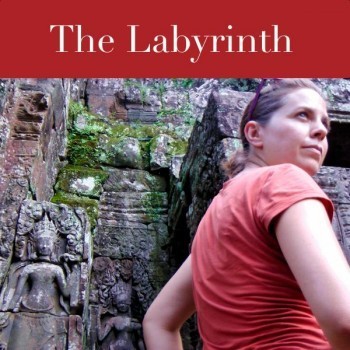 Writer Eden Robins knows how to take risks. When she was in graduate school, she decided to take a risk to become a writer. And when she was a writer, she took the risk of traveling around the world in 6 months. Eden’s journey took her to the UK, central and Eastern Europe, Egypt and Southeast Asia. On this episode of The Labyrinth, learn about how Eden became a writer, how she quit her job to travel the world, and how she and how the strangest thing that ever happened to her revealed mysteries, cultural and economic, about a village in Tanzania.
Writer Eden Robins knows how to take risks. When she was in graduate school, she decided to take a risk to become a writer. And when she was a writer, she took the risk of traveling around the world in 6 months. Eden’s journey took her to the UK, central and Eastern Europe, Egypt and Southeast Asia. On this episode of The Labyrinth, learn about how Eden became a writer, how she quit her job to travel the world, and how she and how the strangest thing that ever happened to her revealed mysteries, cultural and economic, about a village in Tanzania.
Subscribe and listen
Download and Listen: The Labyrinth, Episode 23 – Eden Robins
iTunes
Subscribe via RSS
Links
Eden Robin’s Author site, Monkey Thumbs
Eden on Twitter
Eden on Facebook
December 3, 2012
Podcast delay, shows coming this week
As you know, sometimes life gets in the way. The podcast is about a week late, and I will do my best to post two shows this week to make up for the lost air time. I have been very lucky to line up some KICK-ASS interviews in December, and that means you’re going to be hooked on The Labyrinth as we enter winter. Come join me! In the meantime, here’s the list of previous shows….
November 19, 2012
The Labyrinth, Episode 22 – Caity McCardell
 This week on the Labyrinth, runner and podcaster Caity McCardell is going to teach you how to kiss the ground. When barefoot runners “kiss the ground” with their heels, they are in full contact with the ground, and in great running form. Caity and I talk about her podcast Run Barefoot Girl, and how she took up barefoot running after pregnancy. Caity is interested in stories, and how other people do what they do. We share a long conversation about how to barefoot run, how to alleviate life stress, and how to find communities that support who we really are. We also talk about how to quit jobs that damage your health. Caity also shares her strangest happening — and it’s definitely a strange one.
This week on the Labyrinth, runner and podcaster Caity McCardell is going to teach you how to kiss the ground. When barefoot runners “kiss the ground” with their heels, they are in full contact with the ground, and in great running form. Caity and I talk about her podcast Run Barefoot Girl, and how she took up barefoot running after pregnancy. Caity is interested in stories, and how other people do what they do. We share a long conversation about how to barefoot run, how to alleviate life stress, and how to find communities that support who we really are. We also talk about how to quit jobs that damage your health. Caity also shares her strangest happening — and it’s definitely a strange one.
Subscribe and listen
Download and Listen: The Labyrinth, Episode 22 – Caity McCardell
iTunes
Subscribe via RSS
Links
Run Barefoot Girl Podcast
Vanessa Runs
Christopher McDougall
Listen
November 9, 2012
The Labyrinth, Episode 21 – Nathaniel Wolfe
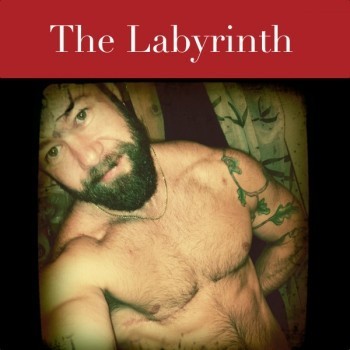 Stories have a transformative power, and in the case of Nathaniel Wolfe, the stories he shared about his life with me also took the podcast to a new place. Nathaniel and I talked about the relationship of the body and the mind, and the kind of body that he felt was truest to who he is. Nathaniel also shares his story about transitioning gender, and what happened when he felt he was finally in the right body. We also discuss the amazing places that martial arts, yoga and barefoot running have taken Nathaniel.
Stories have a transformative power, and in the case of Nathaniel Wolfe, the stories he shared about his life with me also took the podcast to a new place. Nathaniel and I talked about the relationship of the body and the mind, and the kind of body that he felt was truest to who he is. Nathaniel also shares his story about transitioning gender, and what happened when he felt he was finally in the right body. We also discuss the amazing places that martial arts, yoga and barefoot running have taken Nathaniel.
Subscribe and listen
Download and Listen: The Labyrinth, Episode 21 – Nathaniel Wolfe
iTunes
Subscribe via RSS
Links
Nathaniel Wolfe
Shifting Strands blog
Listen
November 5, 2012
The Labyrinth, Episode 20 – Grá Linnaea
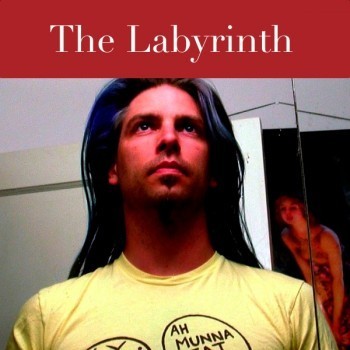 Author and Shimmer magazine editor Grá Linnaea takes us into the realms of surrealism, world travel and music. Grá shares how his own issues with ADHD allowed him to develop his own perception of the world and of people, and how he has had to work with ADHD to hone his writing. In this episode, we investigate the connections between music and writing, the rhythm of language, and his writing process. We also tackle the ideas of Phillip K. Dick – what if reality is nothing but a construct? Download and listen to find out.
Author and Shimmer magazine editor Grá Linnaea takes us into the realms of surrealism, world travel and music. Grá shares how his own issues with ADHD allowed him to develop his own perception of the world and of people, and how he has had to work with ADHD to hone his writing. In this episode, we investigate the connections between music and writing, the rhythm of language, and his writing process. We also tackle the ideas of Phillip K. Dick – what if reality is nothing but a construct? Download and listen to find out.
Subscribe and listen
Download and Listen: The Labyrinth, Episode 20 – Grá Linnaea
iTunes
Subscribe via RSS
Links
Gra Linnaea
Shimmer Magazine
Huricane Sandy: How to Help
Listen

